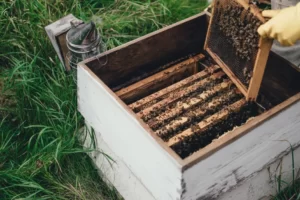Table of Contents
- Aims
- Trial Design
- Endpoints
- Participant Selection
- Interventions and Investigational Products
- Study Setting
- Randomization and Blinding
- Participant Timeline and Schedule of Assessment
- Withdrawal
- Data Collection and Management
- Statistical Analysis
- Safety Measures
- Patient Sampling
- Management Group
- Patient Involvement
- Ethics and Dissemination
This is a single-blinded randomized feasibility study designed to estimate the efficacy of a manuka honey sinus rinse on symptoms associated with sino-nasal disorders in CF (Cystic Fibrosis) patients. The study will be conducted at the All Wales Adult Cystic Fibrosis Centre (AWACFC) at University Hospital Llandough over an 18-month period, starting from January 2019 and ending in October 2021. Due to the COVID-19 pandemic, the study was paused from March 2020 to July 2021. The aim of this trial is to determine the potential of manuka honey as an adjuvant for current sinus rinse protocols for CF patients and to establish its baseline antibacterial efficacy and its effects on microbial community composition. The study will follow the SPIRIT reporting guidelines.
Aims
Feasibility aims
The primary aim of this trial is to determine its feasibility in terms of patient recruitment and compliance with the intervention strategies.
Primary clinical aim
The primary clinical objective of this trial is to determine whether the addition of manuka honey to a sinus rinse impacts the SNOT-22 (Sinonasal Outcome Test) score of CF patients.
Secondary clinical aims
- Determine if the addition of manuka honey to the sinus rinse improves the quality of life for CF patients.
- Establish if the addition of manuka honey to the sinus rinse affects bacterial load and/or community composition in the nasal/paranasal cavities of CF patients.
- Determine if the addition of manuka honey to the sinus rinse alters the structure and viscosity of sputum mucus in CF patients.
Trial Design
The study will be structured as a 2-sided equality trial with before and after measurements for each participant. The aim is to sample approximately 30-40 patients over the 18-month study period. The sample size was determined based on a power calculation and consideration for eligibility criteria and potential drop-out rates. The study will screen about 290 patients per year, of which 50% will complete the SNOT-22 questionnaire. Approximately 50% of those completing the questionnaire should meet the eligibility criteria. With a conservative recruitment rate of 30-40%, it is realistic to enroll 20-30 patients per year. To achieve a power of 80%, a minimum sample size of 21 is required. The target sample size for this study is 30, considering potential drop-outs.
Eligible patients will be randomly assigned to one of two groups with an allocation ratio of 1:1. The randomization will be done in three consecutive groups of ten patients to ensure an even distribution of control and intervention groups throughout the study. Group 1 will be the control group receiving the standard nasal rinse protocol, while Group 2 will be the intervention arm receiving a modified nasal rinse protocol containing manuka honey. Both groups will complete the protocol daily for 30 days.
Endpoints
The sampling will conclude either on the last visit of the last participant or once an adequate number of participants have completed the study to satisfy the power calculation.
Participant Selection
Potential participants attending the AWACFC will be initially identified by the clinical research team. Written patient information sheets will be provided, and potential participants will have at least 24 hours to consider enrolling in the study. The study will be fully explained to the patient, and if they meet the inclusion/exclusion criteria and provide written informed consent, they will be enrolled.
Interventions and Investigational Products
The investigational product is a manuka honey sinus rinse. Manuka honey is a CE-approved medical device commonly used for the treatment of surface wound infections. The control group will receive a standard nasal rinse protocol, while the intervention group will receive a modified protocol containing manuka honey. Both groups will complete the protocol daily for 30 days, keeping a compliance diary and taking observational notes.
Study Setting
Recruitment and sample processing will take place at the AWACFC, with data analysis split between the Cardiff School of Biosciences and the Institute of Life Sciences. The study sponsor is Swansea University.
Randomization and Blinding
Study participants will be randomly assigned to either the control or intervention arm using a random number generator. The academic research staff analyzing the data will be blinded to the group allocation, while the clinical research team will remain unblinded.
Participant Timeline and Schedule of Assessment
The timeline of events includes pre-participant recruitment, baseline measurements, treatment period, and follow-up measurements. Baseline measurements will include eligibility assessment, completion of questionnaires, and sample collection. Repeat measurements will be taken at the follow-up meeting after 30 days. Participants will be encouraged to keep a compliance diary.
Withdrawal
Participants have the right to withdraw from the study at any time. The clinical care team may also discontinue a participant if necessary. If a patient withdraws, all identifiable samples will be destroyed, but the data generated up to that point will be retained for analysis.
Data Collection and Management
Baseline data will be collected at the start of the study, and additional measurements will be taken during the follow-up meeting. Non-identifiable clinical data will be entered into the CF registry and recorded on a clinical record form. Data will be stored on a password-protected database for analysis.
Statistical Analysis
Recruitment numbers and compliance with the study protocols will be assessed. Qualitative analysis will be conducted on the questionnaires to compare control and treatment arms and pre- and post-treatment scores. Bacterial load and community composition will be analyzed using contingency tables with odds ratios, taking into account co-variants.
Safety Measures
Adverse events (AE) and serious adverse events (SAE) will be recorded. AEs related to the sinus rinse protocol and potential allergic reactions will be monitored. SAEs will be reported to the relevant committees.
Patient Sampling
Samples will be collected by respiratory consultants or clinical research nurses at the AWACFC. The academic team analyzing the samples will be blinded to the intervention received by the patient.
Management Group
The trial management group will conduct monitoring visits every three months to ensure protocol adherence. A quality assurance program is also in place to address any deviations from the protocol.
Patient Involvement
Selected patients at the AWACFC will review the information sent to prospective participants to ensure clarity and understanding.
Ethics and Dissemination
Ethics approval was obtained from Research Ethics Committee Wales. The study will comply with applicable regulatory requirements and ensure confidentiality and data protection. Results will be disseminated through presentations, publications, leaflets/posters at the AWACFC, and online videos. Participants will receive leaflets summarizing the main findings of the study.



